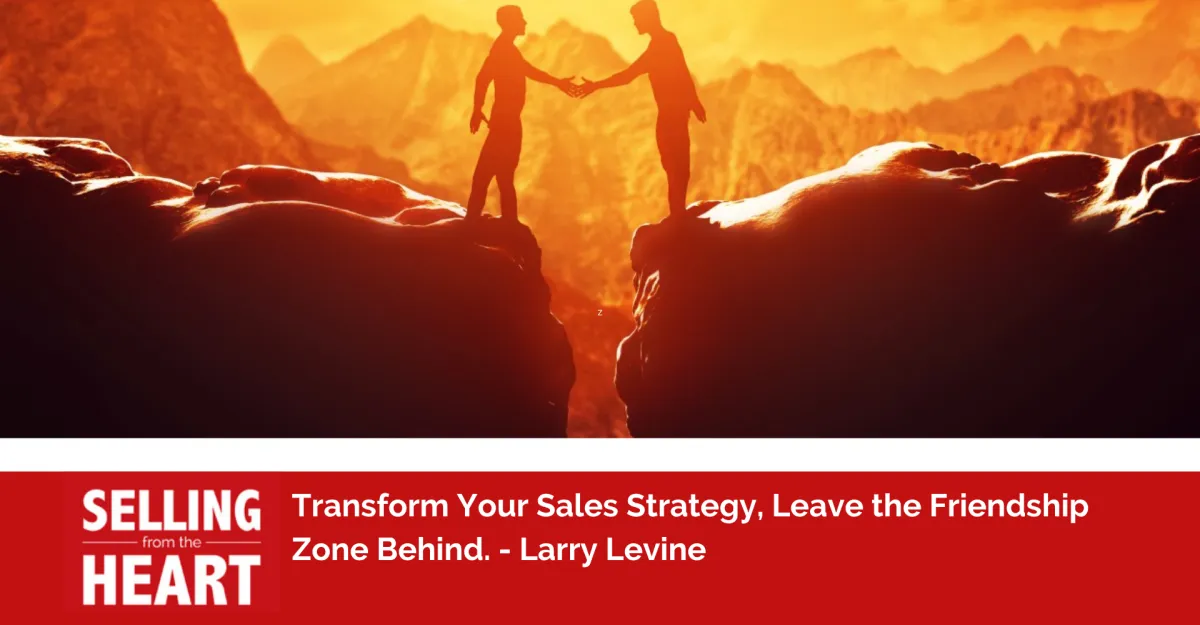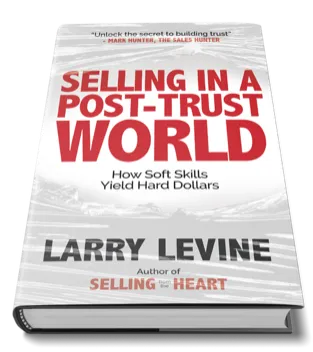
Transform Your Sales Strategy, Leave the Friendship Zone Behind.
“The courage to be happy also includes the courage to be disliked. When you have gained that courage, your interpersonal relationships will all at once change into things of lightness.”
Ichiro Kishimi
The main theme inside the book, The Courage to be Disliked, is that we all have the power to change our lives and find happiness, regardless of our past experiences.
The authors main points are that one's unhappiness is often self-imposed, stemming from a fear of being disliked by others and the desire for approval
Let's tailor this to the sales world as now the quote challenges the deep-rooted desire many salespeople have to being liked.
Salespeople have been conditioned to believe that if prospects like them, they’ll buy from them. True sales success, the kind that leads to meaningful, long-term relationships doesn’t come from being liked. It comes from being trusted.
Therefore, having the courage to be disliked means you’re willing to:
Ask the hard, truth-telling questions that move a deal forward.
Stand firm on your values, even if it risks short-term approval.
Be real about whether your solution is the right fit, instead of forcing it.
Lead with authenticity, not performance.
When you're willing let go of the need for universal approval, you sell from a place of freedom, conviction, and alignment.
You stop people-pleasing and start purpose-serving. The result? Conversations feel lighter, trust deepens faster, and you attract the right type of clients, the ones who value you for who you truly are.
The most courageous sales professionals are those who care deeply, challenge boldly, and show up authentically, even when it’s uncomfortable.
When you have the courage to be disliked, you unlock the freedom to sell from the heart.
As we kick off our time together, I ask all you to think about this... There's a hidden trap that one must face when wanting to be liked.
Every authentic salesperson wants to build relationships. However, here’s the conundrum, your genuine desire to be liked might be the very thing holding your sales career back.
I believe authentic relationships in sales are built on trust, value, and sincerity, not people-pleasing or approval-seeking.
When your self-worth becomes tied to whether prospects or clients like you, you start selling from fear, not from authenticity.
We're going to unpack why this happens, how it shows up in your behavior, and most importantly, how to break free from the friendship zone while staying true to your authentic self.
Why the Need to Be Liked Stunts Sales Growth
Trust must come before the sale, but friendship often follows it. Confuse the order, and you just might lose both.
It Shifts the Focus from Helping to Pleasing
Salespeople driven by approval often prioritize comfort over challenge. They trade authenticity for acceptance. They prioritize comfort over courage, seeking harmony instead of healthy tension.
They play it safe by avoiding the bold, courageous and insight-rich questions that challenge a client’s current thinking because discomfort feels risky.
Guess what? Comfort doesn’t create change.
It takes courage, not comfort, to ask questions that invite your client to reflect, to reconsider, to grow.
When your focus shifts from being helpful to being liked, your motive becomes self-preservation. You start protecting your image instead of protecting your client’s potential.
You avoid confronting misalignment. You hesitate to share an uncomfortable truth. When this starts to happen, your sales conversations lose their transformative edge, the very thing that builds trust.
Authenticity demands bravery. This is about showing up with empathy and conviction. It's about caring enough to challenge, not just to comfort.
So, ask yourself... Am I trying to make my clients feel good about me or am I helping them get better because of me?
It Creates the Friendship Zone
The friendship zone in sales is deceptively cozy. Your clients enjoy speaking with you, praise your follow-ups, maybe even take your calls, but inconsistently buy from you.
Why? Because friendship alone doesn’t create business value.
The Trust Formula reminds salespeople that authentic relationships are only one part of the equation. Trust also requires Meaningful Value, Inspirational Experience, and Disciplined Habits.
When you lead only with friendliness, without bringing business insight or meaningful outcomes, you become a pleasant vendor, not a trusted advisor.
Being liked might get you meetings, but being trusted gets you results.
It Dilutes Your Boundaries and Undermines Respect
Clients will struggle to respect people who won’t challenge them. People-pleasing salespeople tend to say yes to unreasonable requests, discount too quickly, and hesitate to assert their expertise.
The result of all of this? They lose authority and diminish perceived value.
In Selling in a Post-Trust World, trust is built through conviction and belief, by standing for something, not blending in.
When you’re overly concerned with keeping everyone happy, you dilute your message, soften your opinions, and weaken your professional credibility.
Authenticity doesn’t mean saying yes to everything, it means being real enough to say no when necessary.
It Keeps You in the Shallow End of Relationships
True relational depth requires truth.
We all can agree that the business world of today has become distrustful. Authentic relationships are anchored in truth, love, and courage. This happens by communicating boldly, applying principles with confidence, and being accountable.
When you avoid tough conversations because you fear rejection, you sacrifice honesty for harmony. You never reach the deeper conversations that uncover the real business challenges and emotions driving client decisions.
To move from being liked to being trusted, you must have the courage to speak truthfully, even when it’s uncomfortable.
Signs You’re Stuck in the Friendship Zone
You might be in the friendship zone if...
You’re afraid to ask closing questions because you don’t want to push.
You over-invest time with people who like you but haven’t bought in months.
You lower your price without being asked.
You avoid direct feedback with clients out of fear of ruining the relationship.
You confuse responsiveness with value.
You don’t escape the friendship zone by trying harder to please, you rise above it by choosing to lead.
Trusted sales professionals don’t avoid discomfort; they embrace it for the sake of the client’s growth.
When you show up with authentic care and courageous conviction, you shift the relationship dynamic.
You stop being seen as the friendly salesperson and start being seen as the trusted professional who tells the truth, delivers value, and helps clients see what they can’t see on their own.

Click here to order the book that started the movement
Move from Approval-Seeking to Influence
Being liked might get you in the room, bring meaningful valuable keeps you seated at the table.
Reframe Your Mindset, You’re Not in the Friendship Business
Friendship might be a byproduct of selling authentically, but it’s not the goal. Your mission is to create meaningful value and drive results.
Trust begins when you establish and connect meaningful value to your clients' desired outcomes.
This means you show up with purpose and perspective, not just pleasantries.
You must shift your mindset from:
I want them to like me to I want them to trust me.
I hope they’ll say yes to I’m here to help them make a confident decision.
Lead with the Trust Formula
Applying the Trust Formula is your roadmap out of the friendship zone.
Trust = Authentic Relationships + Meaningful Value + Inspirational Experience + Disciplined Habits
Here’s how to apply it:
Authentic Relationships - Be real, not rehearsed. Show genuine care, but pair it with business insight.
Meaningful Value - Learn what value means to your client’s. Learn how to mitigate risk and deliver this is in a meaningful way.
Inspirational Experience - Make every interaction memorable. Show up prepared, bring insights, and follow through with consistency.
Disciplined Habits - Consistency builds credibility and reliability creates trust.
Authenticity without discipline is charm; authenticity with discipline is influence.
Ask Bold, Value-Driven Questions
Courageous questions build credibility. Approval-seeking salespeople ask permission; authentic professionals seek truth.
Stop trading comfort for courage.
Ask questions that make your client stop and think, even if it makes them squirm in a good way.
Anchor every conversation in purpose. Bring clarity as to why you’re there by helping them to seek business betterment.
What’s standing in the way of achieving this goal?
If nothing changes, what will that mean for your team next quarter?
What’s one risk you can’t afford to ignore right now?
Folks, these aren’t sales questions, they’re leadership questions. You know what? They’ll earn you respect far faster than compliments or coffee chit chats.
I believe when you engage in deep business conversations with your clients and come from a place of genuine concern, you honor the relationship rather than risk it.
Stand Firm in Your Professional Value
Sales isn’t about chasing client accolades; it’s about earning trust through competence and conviction.
Sustainable sales growth happens when you deliver meaningful value that matters most to your clients.
Approval-seekers compromise, trusted and strategic advisors convince.
When you truly believe in the transformation you deliver, you’ll stop apologizing for price, stop discounting your worth, and start commanding respect.
Truth in Love Conversations
Authentic relationships are built on both courage and care. Speaking truth without love is arrogance; love without truth is enabling.
This is about unflinching honesty combined with unconditional respect and care. This is about compassionate conversation where the intent is to foster growth, not to inflict pain, and this becomes crucial for deep, meaningful and resilient relationships.
This is about helping your clients see past their blind spots.
Here’s a practical way to create some kind of balance...
Truth - Based on what I’m seeing, your current process might be limiting growth.
Love - I’m sharing this because I care about your success and want to help you achieve your goals.
This combination transforms perception and creates massive levels of trust.
Redefine What Being Liked Means
There’s a difference between being liked and being respected. The first is emotional; the second is earned.
Being liked is about connection, being respected is about contribution.
When you consistently show up with authenticity, insight, and reliability, your clients will like you for who you are and respect you for what you bring.
Intention matters more than technique.
Your intent must shift from being accepted to being impactful.
Building the Habits That Sustain Confidence
Breaking free from approval-seeking isn’t a one-time shift, it’s a disciplined habit, just like authentic selling itself.
Approval-seeking is about validation. Authentic confidence is about conviction. The first feeds your ego, the second fuels your purpose.
You can make all this stick by...
Self-reflecting - After every client interaction, pause and ask yourself... Did I seek approval, or did I create value?
Reflect not just on what you said, but why you said it. Were your words meant to help the client see more clearly or to make yourself feel more comfortable?
The more honest you are with yourself, the more authentic you’ll become with others.
Creating accountability - None of us are immune to blind spots. Partner with a coach, mentor, or trusted peer who isn’t afraid to call out approval-driven behavior. Review and identify areas where the relationship feels friendly and a bit stagnant.
Accountability doesn’t expose weakness, it strengthens integrity. It reminds you that growth rarely happens alone.
Creating courage - This is a muscle, and it only grows through consistency. Schedule one uncomfortable conversation every week. Challenge an assumption and push for clarity.
Address a stalled opportunity with truth instead of politeness.
Celebrating impact - Compliments fade but client outcomes endure. Redefine what winning means.
Instead of measuring success by praise or personality, measure it by the transformation you helped create. Track stories of clients who grew because you cared enough to challenge them.
The Heart of the Matter, From Liked to Trusted
Selling from the Heart isn’t about being liked, it’s about being real. It’s about showing up with sincerity, courage, and purpose in a profession that too often rewards image over integrity.
Being liked is easy as it asks for charm. However, being trusted is hard as it demands character.
The business world doesn’t need more agreeable, nice salespeople who nod politely and avoid discomfort. What it desperately needs are authentic leaders in sales.
Professionals who lead with empathy, who speak truth even when it’s uncomfortable, and who care enough to challenge clients toward growth.
Trust is born at the intersection of honesty and care. It grows when your conviction outweighs your need for approval. It deepens when your discipline turns good intentions into consistent action.
So, the next time you feel that quiet tug to please, to soften your truth, or to protect the relationship at the expense of real value, remember this... You can’t be everyone’s friend and still be their trusted advisor.
Friendship seeks comfort, while trust seeks transformation.
I encourage you to lead with heart, speak with truth and serve with conviction.
You’ll soon find that the deeper your authenticity runs, the stronger your relationships. The more meaningful your relationships are the more consistency in your results.
The true heart of selling is the mental shift from being liked to being trusted.
Originally published on Larry Levine's LinkedIn.




